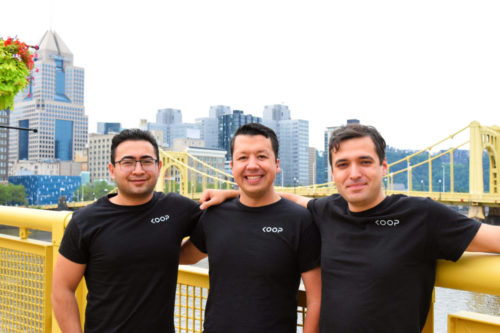Artificial intelligence and autonomy come with a host of unprecedented considerations in terms of safety and liability, so it only makes sense that insurance should change alongside them.
That’s where North Side-based autonomy insurance startup Koop Technologies saw a market opportunity. Koop’s product assesses risks and rates of autonomous technology in ways that are better catered to the machine-centric decisions of these innovations.
Founded in 2020 and headquartered at Nova Place, Koop announced on Monday that it had closed a seed funding round of $2.5 million, led by Palo Alto-based Ubiquity Ventures, a firm that was founded in 2017 by former Bessemer Venture Partners Principal Sunil Nagaraj. The seed round was also supported by Bee Partners, Sure Ventures and Westwave Capital.
This round is significant not only for Pittsburgh, which saw a poor first half of the year in venture capital volume, but for the broader autonomy industry. As technology like autonomous vehicles becomes more of an everyday reality, so too will new businesses needed to support the transition to common use.
Right now, the autonomy industry relies on traditional insurance companies to assess the risks and coverage plans for their products. But that whole way of thinking needs to change, cofounder and Chief Commercial Officer Kamron Khodjaev told Technical.ly: Those models don’t always encompass the full spectrum of risks around autonomous technology simply because machines don’t behave the same way that humans do.
Despite the success those traditional companies have had with tracking human-centric risks, Khodjaev pointed to a “shift to machine learning risks in the real-world operating environments” for why Koop’s data-driven technology is a necessary supplement to the usual approach. “For this reason, we partner with some of the most prominent insurance companies in the world and help them with data-driven underwriting,” he said.
Khodjaev and his team saw a chance to leverage the new data that autonomous technology produces and create new and more appropriate insurance frameworks around it. Working with both insurers and autonomous technology clients, he said Koop can “build provider tools that help us access the data and reveal internal frameworks that help us analyze that data so that we can provide that out to insurance carriers.” Koop also provides its clients with a portal where they can manage and understand their insurance needs, as well as share relevant data using Koop’s API.
So far, the company has clients across 13 different states, focusing on locales where robotics and autonomous mobility work is clustered, Khodjaev said. And while much of Koop’s platform is focused on autonomous vehicles, he sees a broader range of automation clients in its future as well: “It’s primarily the areas where there’s a clear shift from human-centric to machine-centric risks.”
Beyond continuing to develop Koop’s product and ship it to the company’s current customers, Khodjaev said the funding will also allow the team to boost its customer acquisition effort. Koop plans to use the seed funding to expand its team with more hiring as well.
Koop’s choice of a Pittsburgh headquarters is unsurprising, given that three of its four cofounders attended the University of Pittsburgh. But Khodjaev and his team were also attracted to the overall affordability of the city and its heavy autonomous vehicle presence, mentioning Waymo’s announcement of a new office opening in Bakery Square as a sign that the industry is growing here.
“Being closer to our clients, being closer to our partners is very valuable,” the CCO said, emphasizing the ease of communication that comes with that proximity. “We love the fact that we can have all of this, while at the same time keeping our costs relatively low.”
Sophie Burkholder is a 2021-2022 corps member for Report for America, an initiative of The Groundtruth Project that pairs young journalists with local newsrooms. This position is supported by the Heinz Endowments.Before you go...
Please consider supporting Technical.ly to keep our independent journalism strong. Unlike most business-focused media outlets, we don’t have a paywall. Instead, we count on your personal and organizational support.
Join our growing Slack community
Join 5,000 tech professionals and entrepreneurs in our community Slack today!

The person charged in the UnitedHealthcare CEO shooting had a ton of tech connections

From rejection to innovation: How I built a tool to beat AI hiring algorithms at their own game

Where are the country’s most vibrant tech and startup communities?


